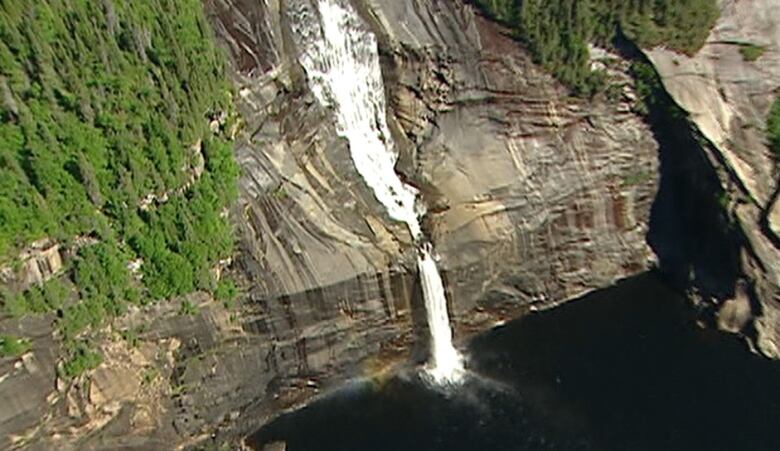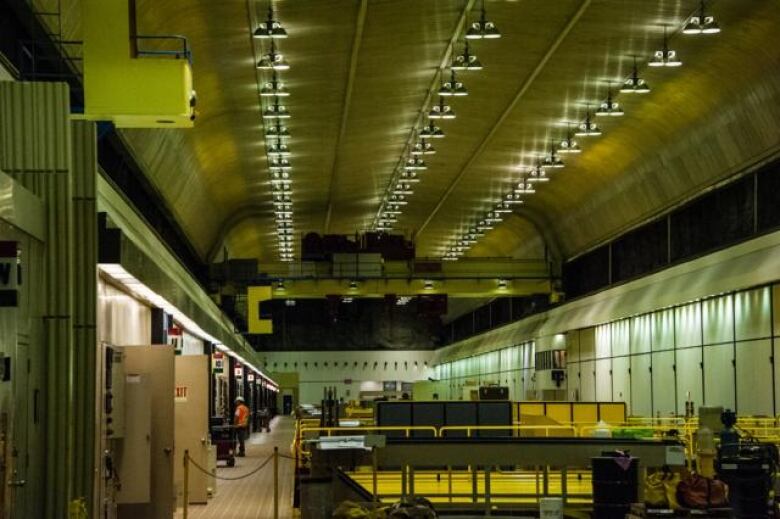Innu Nation suing over disruption to land and culture caused by Churchill Falls project
Innu leaders say hydroelectric project destroyed burial grounds, traditional lands

Saying their community's culture and way of life was devastated by theconstruction of a hydroelectric project, the Innu Nation of Labrador is taking Hydro-Qubecand Churchill Falls Corp. to the Supreme Court ofNewfoundland and Labrador.
The Innu Nation announced its $4 billion statement of claim Tuesday at a news conference, wherecommunity leaders saidtheirpeople have lived with anger, hurt and loss for decades, since construction began in 1967.
That construction, which continued into the mid-'70s, backed by the power utilities of Quebec and Newfoundland and Labrador, led to subsequent flooding of ancestral lands, Innu Nation leaders said.
"The impact of Churchill Falls has been felt across generations of Innu. What happened, it was not right. Our elders deserved better treatment then, and we demand better treatment now," said Grand Chief Etienne Rich.
In a recorded video played at the conference, two community elders said construction caused the destruction of their traditional burial grounds and hunting grounds in the western part of Labrador.
There was no environmental assessment nor Indigenous consultation at the time, said Innu Nation lawyers and community leaders.
"We certainly did not consent to it. In fact, we were not even told when the flooding would begin, or how much the water would rise," said Deputy Grand Chief Mary Ann Nui, who also spoke at the conference.
My God, it is 50 years past due.- Innu Nation Grand Chief Etienne Rich
The hydroelectric project involved a series of dikes on the Churchill River the longest river in Labrador just above Churchill Falls. The project resulted in the flooding of an area of land larger than Prince Edward Island, which is now known as the Smallwood Reservoir.
That land had once been home toInnu burial grounds and gathering areas, caribou migration routes and habitat for countless forms of wildlife essential to the community'straditional way of life, Rich and Nui said.
"We feel that loss today. We inherited that loss. It's time to make it right," said Rich.
While the generating station is located in Labrador,the lion's share of its power and those associated profitsflowto Hydro-Qubec until 2041 under the terms of a 1969 contract that has been disputed numerous times in court.

Past attempts rebuffed
Tuesday's court action comes after years of attempts by the Innu Nation to get Hydro-Qubec to discuss reparations without resorting to the legal system, Rich said.As recently as last year, Innu Nation sent a letter to the utility chief's executive officer and did not receive a response, he said.
"Every time we try to sit down with them, they always avoid us," he said. The Innu Nation remainsopen to discussions, he said.
"My God, it is 50 years past due."
The $4-billion figure stems from estimating aportion of the utility's profits over the lifetime of the contract, said Nancy Kleer, a lawyer forInnu Nation.
"Hydro-Qubechas made billions of dollars from that contract. It has not paid us a single penny for the damage to our land, or damage to our life and to our people," said Rich.
The government of Newfoundland and Labrador agreed to compensation in 2011, when it signed the New Dawn agreement with the Innu Nation.
New Dawn was,in part, meant to address grievances caused by the Upper Churchill construction by paying the Innu Nation $100 million over 30 years, giving the communitylegal title over what had previously been unceded territory, and a share of power profits once the generating station reverts back to the province's control in 2041.
Hydro-Qubec 'surprised'
A spokesperson for Hydro-Qubec said theutility was caught off guard by Tuesday'slegal action.
"We were surprised by this request," said Gary Sutherland.
He declined to comment further, saying he hadn'tseen the Innu Nation's statement of claim.
"Hydro-Qubec at this point is going to read the legal documents when they arrive, if they have not already arrived," he told CBC News.
"We'll have to see after that."
But Sutherland did point to the New Dawn agreement, which hasprovided some measure of compensation, and said the power plant does not lie within Quebec's boundaries and is not operated by Hydro-Qubec.
Lawsuit timing
Kleer said the time has come for Hydro-Qubec to agree to a compensation deal of its own, in an era marked by reconciliation efforts between governments and Indigenous people in Canada.
The Innu Nation is in the midst of formalizing its land claims agreement with the governmentof Canada, with the two parties having an agreement in principle after decades of talks.
"They have Aboriginal title to these lands.It is their land," saidKleer.
But under that land claim, there's no ability to redress historic wrongs, she said, hence the need to go directly to Hydro-Qubec.
"You need to understand the Innu treaty, like all modern treaties, will not provide compensation for the impacts of historic projects on Innu lands that have infringed their aboriginal rights," Kleer said.

The legal team also saidthat during the Upper Churchill construction, the Innu Nation was in state of massive upheaval and disorganization, having been forced from a migratory way of life into settlements by the federal government that now stand as the communities of Natuashish and Sheshatshiu, with a combined population of about 3,200.
"They weren't in any position to take strong action in the late 1960s and the '70sin order to protect and advocate for their rights," Kleer said.
Kleer said now that the claim has been filed in court, it's up to Hydro-Qubec to respond, either in out-of-court negotiations or by filing astatement of defence.
With files from Mark Quinn












_(720p).jpg)


 OFFICIAL HD MUSIC VIDEO.jpg)
.jpg)



























































































